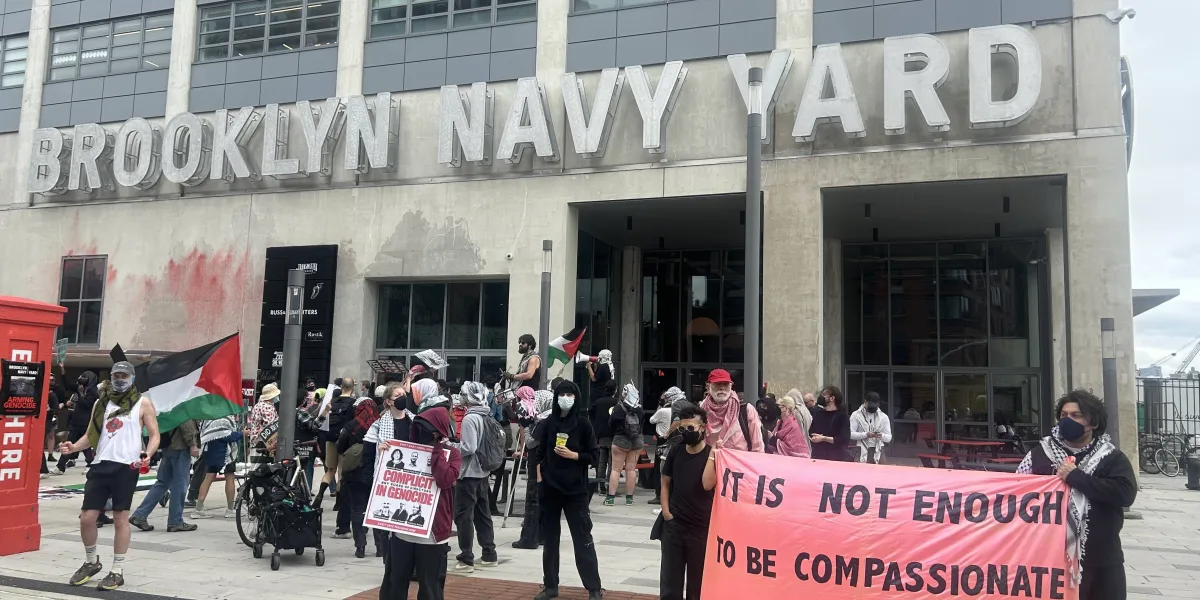
New York City markets the Brooklyn Navy Yard as an economic hub for minority- and women-owned small businesses.
But the city-owned industrial park also leases space to two companies that provide drones and license camouflage technology allegedly used by the Israeli military.
Protesters have been pushing for the Navy Yard to evict the companies for over a year. New York state Sen. Jabari Brisport joined the protesters on Wednesday in calling for the companies’ eviction. “Mark my words: They will be removed,” he said outside the complex.
One company, Easy Aerial, produces small surveillance drone systems and drone controllers and is led by Ido Gur, a veteran of the Israeli air force. On a LinkedIn post last year, Easy Aerial shared a post from one of its investors, the Israeli fund Cavaret Ventures, which said that the company had played “a pivotal role” in meeting Israel’s requirements for its war on Gaza.
The other, Crye Precision, acknowledged in a lawsuit that their trademarked MultiCam camouflage patterns have been used by the Israeli military, and their website for their camouflage products lists the Israeli tactical gear company Agilite as a partner, which advertises its use by the Israeli military. Last fall, a whistleblower at Crye also told Drop Site News that the company supplied the Israeli armed forces.
Crye Precision denies that it provides apparel for the Israeli military. A company spokesperson told The Intercept that protesters’ claims about Crye Precision are false and misleading, noting also that “Crye Precision does not sell weapons or drones, nor do we have any contracts with the Israel Defense Forces (IDF) or any Israeli manufacturers.” They said the mention of Israel in the federal court filing was “incorrect and an oversight.”
Easy Aerial did not respond to a request for comment.
Pro-Palestinian activists have been pushing the Brooklyn Navy Yard Development Corporation, or BNYDC, a not-for-profit organization set up by the city whose CEO is appointed by the mayor, to evict both companies since 2024. The Demilitarize Brooklyn Navy Yard campaign has frequently picketed at the complex, testified at BNYDC board meetings, and organized a petition signed by 115 Navy Yard workers and tenants pushing for the eviction.
Protesters’ demands have been unmet, and the BNYDC maintains that there are no weapons manufacturers on the premises. A spokesperson for the BNYDC said the group has no legal basis to consider eviction given that neither lease regulates the particular business activities of tenants. Companies that are tenants in the Navy Yard don’t have to pay real estate taxes, and can be eligible for special incentives that provide income tax credits and reduce regulated energy costs.
On Wednesday, the city development corporation decided to crack down on the protests. The BNYDC banned activists from giving public comment at a scheduled board meeting and holding a press conference in the courtyard, which is public city property.
Denied entry, some protesters blocked an entrance to the Navy Yard. New York Police Department officers arrested eight protesters; seven were charged with obstructing governmental administration and disorderly conduct. A photographer said he was assaulted by a person affiliated with the complex; he posted a photo on Instagram of his bleeding neck, which he described as a severe laceration that needed stitches. The NYPD corroborated the photographer’s account, noting that a 48-year-old man was punched in the chin by a 26-year-old man, causing a laceration. After the arrests, a crowd of more than 100 protesters chanted outside the Brooklyn Navy Yard, to the steady beat of drums and pots and pans, accompanied by an accordion, as well as some saxophones, clarinets, and trumpets.
Asked why press and community members couldn’t enter the premises, security outside the venue cited “business reasons” but would not elaborate. Pressed by The Intercept on what the “business reasons” were, an activist interjected: “The business reason is that they are repressing a community who is here speaking out against genocide.” A BNYDC spokesperson later explained the Building 92 courtyard was closed for security reasons.
Brisport, the state senator, said in an interview that protesters’ inability to give public comment or hold a press conference in a public courtyard breached their First Amendment rights and “does not look good.”
“People do things like this when they feel guilty,” he said, referring to the BNYDC’s alleged repression of speech.
BNYDC officials argue that their changes to operations, including the creation of a designated area for peaceful protest by Building 77’s entrance, are intended to ensure the continued safety of tenants and protesters. They accused protesters of failing to comply with requests to keep entry and exit points clear.
Protesters also voiced concerns around transparency. The Brooklyn Navy Yard’s directory lists Crye Precision under a “fashion/accessories” category and Easy Aerial under “arts/photography.”
“If you’re bold enough to allow them to rent here, to get subsidized with our tax dollars, at least be honest,” said Maisha Morales, a Fort Green resident and community advocate. The space used by these businesses could be given to Black and brown-led companies that are more reflective of the Navy Yard’s creative vision, she said.
The BNYDC notes that its website directory relies on broad categories to help businesses collaborate, and that its descriptions are broadly accurate: Crye, in addition to designing camouflage patterns, sells its own apparel, and Easy Aerial’s drones incorporate cameras.
Brisport said that when he communicated with Lindsay Greene, president and CEO of the Brooklyn Navy Yard, Greene appeared open to changing the designation of the businesses to make the directory more transparent, but not evicting them.
Brisport said he was still pushing for eviction. He said he has been a “huge supporter” of the Brooklyn Navy Yard but “absolutely could not sit idly by” know they hosted “two companies complicit in the genocide.”
F.D., who lives a mile away from Brooklyn Navy Yard and chose to go by her initials because she fears being doxed, feels much the same way: “I can’t sleep at night because I know the military supply chain of Benjamin Netanyahu’s apartheid campaign reaches all the way into my backyard.”
The Navy Yard protests are just one example of how pro-Palestinian protesters are trying to disrupt the supply chain. Earlier this year, the MIT Coalition for Palestine and BDS Boston celebrated the Massachusetts Institute of Technology cutting ties with the Israeli weapons manufacturer Elbit systems. Pro-Palestinian protesters in the U.S. are also targeting the shipping company Maersk and Zim, which transport military equipment to Israel, as well as Caterpillar, which builds bulldozers used by Israel to destroy Palestinian property in the West Bank. In Europe, dockworkers in Italy and France have blocked ships carrying weapons for Israel.
“A lot of people are horrified by what they’re seeing in Gaza and that can paralyze people but this is a reminder: You can translate that anger and fear you’re feeling into action,” said Layla Saliba, a Palestinian American woman who joined Wednesday’s protest.



